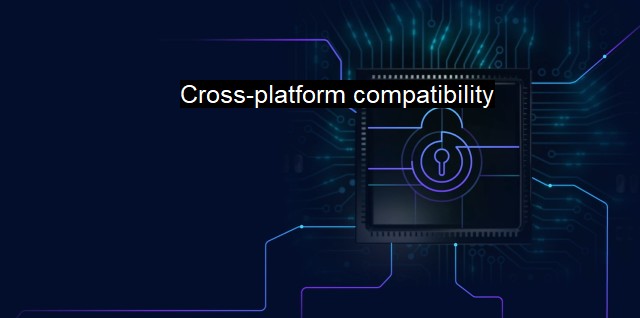What is Cross-platform compatibility?
Securing Diverse Platforms: The Importance of Cross-platform Compatibility for Cybersecurity and Antivirus
Cross-Platform Compatibility refers to the ability of software, systems, or applications to run precisely across multiple platforms or operating systems. These can range from Windows, Android, iOS, Linux, Unix, MacOS, among others. The use of the term "cross-platform" means running the same code on various operating systems while maintaining consistent functionality, activity, and behavior. It is an extremely valuable concept within cybersecurity and the antivirus software arena.Cross-platform compatibility is closely associated with the functionality of software tools and applications, including antivirus programs. Antivirus software or anti-malware technology is an essential component of any strategy that aims to protect services, data, and networks from unauthorized access, cyberattacks, malware, or any other forms of security breaches. It is a crucial layer of defense that works to identify, thwart, or remove potential threats before they compromise systems. Therefore, the cross-platform compatibility of these tools plays a pivotal role in holistic security strategies.
Antivirus software developers have a constructive interest in ensuring cross-platform compatibility. Due to the diverse and complex nature of today's technological environment, businesses, homes, and individuals use devices that run on various operating systems. Each user expects to use a device or software without grappling with differences in functionalities or interface design between systems. Therefore, there is a need for an antivirus solution that works seamlessly across every one of those platforms, providing equal strength, security, and of course, ease of use.
There are several benefits to having an antivirus software that boasts of cross-platform compatibility. Firstly, uniformity of protection across platforms offers a robust defense against threats irrespective of the device or operating system in use. No single machine or platform stands as an easy target for an attack since the same level of comprehensive protection covers all. Secondly, efficiency is greatly improved. For IT administrators, managing a variety of software across several platforms is overly tedious. with a cross-platform compatible antivirus software, all platforms can be managed under a single, unified interface, easing adaptability, deployment, and ease of use.
Pursuing cross-platform compatibility is not without challenges. One key hurdle is the variation in existing operating systems architecture. Every operating system works differently, each with its specific system calls and user interface. Therefore, developing a program that can function seamlessly across all these systems takes considerable time, skills, and resources. This is because it has to adapt to each system's peculiarities without sacrificing function, performance, or consistency.
Different operating systems are regularly updated and patched to accommodate new technologies, functionalities, and secure detected vulnerabilities. These changes may impact how antivirus software functions. As a result, cross-platform antivirus software must consistently update to ensure undeterred compatibility with the updated operating systems.
Despite these challenges, cross-platform compatibility remains an essential requirement for antivirus solutions, attributing to the increasing adoption of various operating systems among different users. Achieving cross-platform compatibility enhances user experience, addresses a broader section of threats, and ensures comprehensive security coverage. It also aids businesses with complex networks to establish a unified security solution across various platforms.
Cross-platform compatibility within the context of cybersecurity and antivirus is a critical aspect that contributes significantly to secure computing experiences. It ensures that antivirus applications provide users efficient, comprehensive, and consistent security services across various operating systems– enhancing cybersecurity defense, dynamic adaptability, and greater efficiency in complex networks. Developers continue exploring ways of making their antivirus software cross-platform compatible because, in today's diverse technological landscape, every device deserves undeterred, dependable, and equally effective protection.

Cross-platform compatibility FAQs
What is meant by cross-platform compatibility in the context of cybersecurity and antivirus?
Cross-platform compatibility refers to the ability of cybersecurity and antivirus software to work seamlessly across multiple operating systems and devices. This is important because users often have multiple devices with different operating systems, and the software needs to be able to protect all of them.Why is cross-platform compatibility important for cybersecurity and antivirus?
Cross-platform compatibility is important because it allows for comprehensive protection across all devices and operating systems. Cybercriminals can target any device, regardless of the operating system it uses, so security software must be able to protect against threats on all platforms.What are some examples of cross-platform compatible cybersecurity and antivirus software?
Some examples of cross-platform compatible cybersecurity and antivirus software include Norton Security, McAfee Total Protection, and Kaspersky Total Security. These programs are designed to work on a variety of operating systems such as Windows, macOS, Android, and iOS.What are some challenges associated with cross-platform compatibility in cybersecurity and antivirus?
One of the main challenges of cross-platform compatibility is that different operating systems have their own unique security features and vulnerabilities. This means that cybersecurity and antivirus software must be able to adapt to and work within each operating system's environment. Additionally, updates to one operating system can often cause compatibility issues with security software on other operating systems.| | A | | | B | | | C | | | D | | | E | | | F | | | G | | | H | | | I | | | J | | | K | | | L | | | M | |
| | N | | | O | | | P | | | Q | | | R | | | S | | | T | | | U | | | V | | | W | | | X | | | Y | | | Z | |
| | 1 | | | 2 | | | 3 | | | 4 | | | 7 | | | 8 | | |||||||